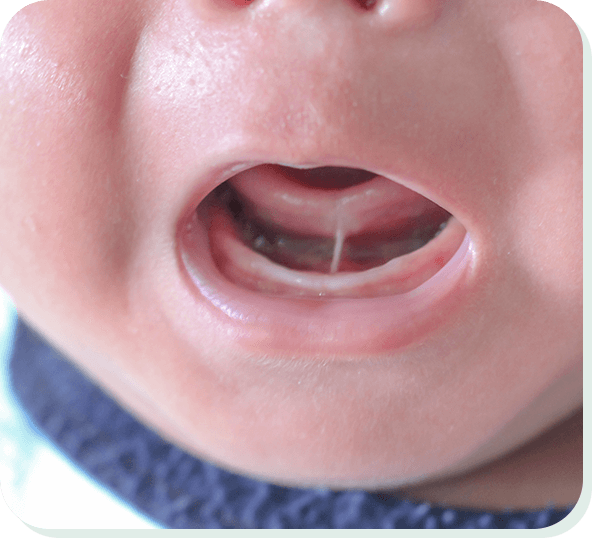Tongue-tie (ankyloglossia) is a common problem involving a band of skin between the underside of the tongue and the floor of the mouth. If this band of skin is very tight it can restrict the movement of a baby’s tongue making breastfeeding difficult.
Tongue ties can be described as anterior or posterior. An anterior tongue tie is usually very easy to see as it holds down the tip of the tongue and can make the tongue look heart-shaped. A posterior tongue tie is found near the base of the tongue and so is often harder to notice.
Private tongue tie division surgery can be offered in babies who are having difficulty breastfeeding. This may have effects on the baby such as poor weight gain and unsettled feeding or for the mother with problems such as painful nipples and mastitis (infection or swelling of the nipples and breast). Before booking for a tongue-tie division it is important that feeding has been observed by a healthcare professional such as a midwife to ensure that there are no other causes.
The procedure
Division of a baby’s tongue-tie can be carried out in the outpatient clinic in just a few minutes. A local anaesthetic is not usually needed as it can delay feeding immediately after the procedure. There are no nerve fibres in the tongue-tie, so it is not thought to be a painful procedure.
Your baby will be wrapped up and held in place by the nurse. The surgeon will separate the tongue-tie using a sterile pair of scissors. We encourage breastfeeding immediately after as this reduces bleeding after the procedure. It’s important to try and avoid feeding your baby for 2 hours before the procedure as we want you to feed immediately after.
The risks
Sometimes a little bleeding occurs after but this usually settles within about 5 minutes. Uncommonly babies can get an infection at the site of the procedure. The main risk of the procedure is a recurrence of the tongue tie over time.
Tongue tie surgery – what to expect after
It’s common to see a little white or yellow spot beneath the tongue for a day or two which disappears on its own. If you notice that your baby has a temperature, is excessively dribbling, or has poor feeding after the procedure, it could be signs of an infection and you should seek medical advice.
For some babies, breastfeeding improves very quickly after tongue-tie release. For others, it can take several feeds before an improvement is seen. Unfortunately, some babies who undergo a tongue-tie division may not have any improvement. It’s important to get further advice from your local breastfeeding support groups or from the person who referred you. We don’t routinely arrange another appointment, but you can contact us if you have any concerns.
Book an appointment with a leading paediatric consultant today.
We are pleased to offer investigation and treatment at our outpatient clinics in West Sussex, Surrey and Wimbledon, London, making us ideally placed to provide expert treatment to children living in Surrey, Kent, and Southwest London, including Balham, Battersea, Brixton, Clapham, Earlsfield, Streatham, Stockwell, Tooting, Wandsworth, Chelsea, Earls Court, Fulham, Parsons Green, South Kensington, and West Brompton.

